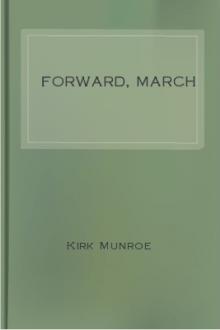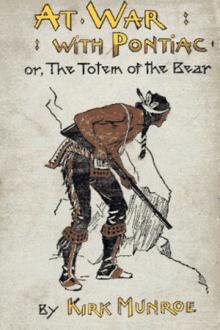Forward, March, Kirk Munroe [some good books to read .txt] 📗

- Author: Kirk Munroe
- Performer: -
Book online «Forward, March, Kirk Munroe [some good books to read .txt] 📗». Author Kirk Munroe
Those Rough Riders left behind at Tampa had already been transferred to Montauk, together with all the horses of the regiment, and these hearty young troopers formed the greater part of the throng now assembled to greet the heroes of Las Guasimas, of San Juan, and of the Santiago trenches, for Colonel Roosevelt and his men were coming home, and the Miami, on which they were embarked, was nearing the wharf. Her decks were crowded with men, worn and weary, clad in battle-stained uniforms, and filled with a great joy at once more breathing the air of their native land. Already was Rollo recognizing familiar faces, and eagerly pointing them out.
"But where is my boy?" cried Mrs. Morris. "I cannot see him."
The others did not answer, for they too were greatly disappointed at not discovering the face they most longed to see.
At length the slow-moving ship was made fast, its gang-plank was run out, and the eager troopers began to swarm ashore. Some were so weak that comrades were obliged to support their feeble steps; but all were radiant with the joy of home-coming. Cheer after cheer greeted each troop, as with silken guidons fluttering above them they marched from the ship, and finally a perfect roar of welcome announced the appearance of their Colonel.
"There's Teddy!" cried Rollo, with a feeble attempt at waving his hat. "Oh, how good it is to see him again!"
"But my boy! Where is my boy?" cried the distracted mother, crowding her way to the very front rank of spectators. As she did so, Colonel Roosevelt passed close to her, and she clutched his arm.
"Oh, sir, my boy! Where is my boy? Do not tell me he is dead!"
"It is Mrs. Norris, Colonel," explained Rollo Van Kyp, pressing forward, "and she is disappointed at not seeing the Lieutenant."
"Thank God, my dear fellow, that you are alive!" exclaimed the Colonel, grasping Van Kyp's hand. Then, in a lower tone, he added, "We had to leave poor Norris behind. He was too ill to be brought on a transport, but he may come at any time on a hospital-ship. Here is a note for his family from one of the hospital nurses. My dear madam," he added, turning to Mrs. Norris, "your son is alive, but detained for a time at Santiago. If you will excuse me now, I will see you again very shortly, and tell you of all the fine things he has done."
With this the embarrassed Colonel passed on, thankful at having thus concluded one of the interviews with anxious parents that he so dreaded.
For a moment Mrs. Norris stared after him in speechless agony; for the mother's keen ear had overheard his low-spoken words to Rollo Van Kyp, and she knew that her boy had been left in Cuba too ill to be moved. Then she uttered a moan, and fainted in her husband's arms.
A little later, when the saddened group had been driven back to the cottage that had been so happily prepared for the reception of their soldier, they read Spence Cuthbert's note, hastily written as the Rough Riders were embarking at Santiago. It told of the terrible suffering that had impelled her to remain behind when the Gray Nun went north, of her disappointment at not hearing anything from Ridge, and how she had at last discovered him in the Santiago hospital, to which she had been transferred immediately after the surrender.
"I did not dare write sooner," she continued, "for we had no hope that he could live; but now he is again conscious, and has recognized me. The doctors talk of sending him north as soon as he can be moved; but, remembering the horrors of the Seneca and the Concho, I dread the voyage for him even more than I do the pestilent air of this awful hospital. In fact, I am in despair, and know not what is best to be done."
"I know!" exclaimed Rollo Van Kyp, as Dulce, with tear-filled eyes, finished reading this pitiful note. "He must be brought back on the Nun. Mr. Norris, she leaves New York to-morrow with a fresh lot of nurses for Santiago, and if you will only take the run down on her you can bring the dear old chap back in comfort."
Mr. Norris hesitated a moment. "Do you realize," he asked, "that if your yacht brings back a single yellow-fever patient it may never be safe to use her again?"
"My dear sir!" cried Rollo, "if she were all that I had in the world she would still be at the service of my dearest friend."
So Mr. Norris thankfully accepted the young millionaire's offer, and sailed the very next day for Santiago.
A week later a Red Cross nurse, worn and wearied almost to the point of exhaustion by her days and nights of caring for sick and dying soldiers, sat in a Santiago hospital beside one of her patients, gently fanning him. His eyes were closed, and she hoped that he slept. As she watched him her own eyes slowly filled with tears; for she did not believe he would ever gain sufficient strength to bear removal from that house of sorrow. The air of the ward was hot, damp, and lifeless. Sickening odors rising from the streets of the filthy city drifted in through its open windows. The whole atmosphere of the place was depressing, and suggestive of suffering that could only end with death.
"Poor Ridge!" she murmured bitterly to herself. "After all your splendid work, it is cruel to leave you here to die, deserted and forgotten!"
Just then the patient opened wide his eyes, and an expression of eager anticipation flitted across his white face. "Dad is coming," he whispered. "I hear his footstep. Oh, Spence, he is here, and will take us home!"
The nurse listened, but heard only the moans of other sufferers, and thinking that this one had dreamed of his father's coming, tried to soothe him with hopeful promises. Then, all at once, she uttered a little cry of joy, for at the far end of the long white ward she saw one of the house surgeons escorting a familiar figure. In another minute Mr. Norris, seeming to bring with him a breath of bracing northern air, stood beside his son's cot.
"I thank God and you, Spence Cuthbert, that my boy is still alive!" he cried. "And now, how soon can we take him north? I have Van Kyp's yacht waiting out here in the harbor, and we can start at a moment's notice."
"I believe I could go this very minute, dad," said Ridge, his voice already strengthened with hope and happiness. "But, father," he added, anxiously, "we must take Spence with us; for she has promised to stay with me as long as I need her, and I know I couldn't travel without her."
"Of course we will take her, son, and keep her, too, just as long as we can."
For three days longer Ridge lay on that cot, gaining strength with each moment of renewed hope and eager anticipation. During this time Mr. Norris occupied the intervals of rest from watching beside his son with visiting the battle-fields near the city over which the young trooper had so bravely fought. On these expeditions he was accompanied and guided by a Cuban named del Concha, recommended by General Wood, to whom he had rendered valuable service by the giving of intelligent and honestly patriotic advice. When del Concha discovered that the American señor whom he was asked to guide was father to his friend, the brave teniente Norris, he was overjoyed to be of assistance to him, and completely won the elder gentleman's heart by praise of his son and stories of the latter's exploits while executing his dangerous mission among the Spaniards of Cuba. Del Concha also told of himself; and, among other things, that, on the very day he had learned of Santiago's surrender, he had married his sweetheart, the brave girl who had assisted Ridge to escape from the Holguin prison, and who was now very nearly recovered from her wound.
At length the joyous day came when Ridge could be moved, and he was carefully borne in a litter, by four of the stalwart negro troopers, in whose company he had charged up San Juan Heights, through the streets of Santiago to the waiting yacht. Besides the young trooper and his proud father, the Nun carried northward a score more of convalescent soldiers, to whom Spence Cuthbert, and a group of her companion nurses, also returning home from their glorious service, gave devoted care.
On the day that Montauk was to be reached, Ridge was strong enough to be carried on deck, where, from a pillowed steamer-chair, he gazed happily at the loved features of the nearing coast. He was the very first to spy his mother, who again waited in trembling eagerness on the wharf, this time not to be disappointed.
"And there are Rollo," he said, to the girl who stood beside him, "and Dulce, and the Colonel. And oh, Spence, to think that but for you I should certainly never have seen them again!"
For many days after the home-coming of our young trooper the Norris cottage was strictly quarantined against a possible outbreak of yellow-fever; but, as Rollo Van Kyp said:
"Who cares? I'm sure I don't; for all of the world I want to see just now is held within these walls."
The very first time Ridge was allowed to go out, he was driven to the Rough-Rider camp to be mustered from service with his regiment. On this occasion he wore a lieutenant's uniform, at which his mother, seated beside him in the carriage, gazed with such undisguised pride that he laughingly accused her of being more susceptible to the influence of brass buttons than any girl of his acquaintance.
Only once after this did our young lieutenant wear his uniform, and that was when, two months later, he was married in a little Kentucky church to Spence Cuthbert, who, at his earnest request, wore as her wedding-dress the costume of a Red Cross nurse.
Dulce was, of course, maid of honor, while Rollo Van Kyp was best man. When the simple ceremony was over, and they were all gathered to wish the radiant couple God-speed on their wedding journey, Rollo unfolded the great news he had received that morning.
"Teddy has been nominated for Governor of New York!" he cried. "And I am to stump the State with him. When he is elected he is going to make me a Colonel on his staff, so that Dulce won't have to marry a mere private after all."
And Dulce, blushing furiously, replied, "I would rather marry a private soldier who had charged up San Juan Hill than any staff-officer in the world."
"How about taking both?" asked Rollo.
***END OF THE PROJECT GUTENBERG EBOOK "FORWARD, MARCH"***
******* This file should be named 16231-h.txt or 16231-h.zip *******
This and all associated files of various formats will be found in:
http://www.gutenberg.org/1/6/2/3/16231
Updated editions will replace the previous one--the old editions will be renamed.
Creating the works from public domain print editions means that no one owns a United States copyright in these works, so the Foundation (and you!) can copy and distribute it in the United States without permission and without paying copyright royalties. Special rules, set forth in the General Terms of





Comments (0)